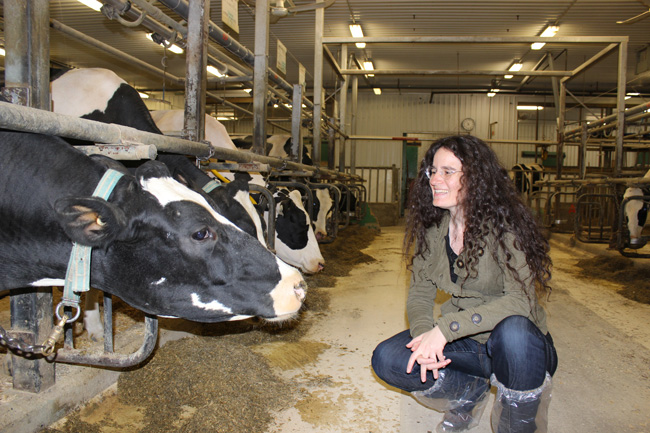
In the barn with McGill’s new NSERC Industrial Research Chair on Sustainable Life of Dairy Cattle
By Kathryn Jezer-Morton
Most of Canada’s milk comes from Quebec and Ontario, but until recently, no academic research position was dedicated to dairy welfare in Quebec. Prof. Elsa Vasseur is changing that. As the newly appointed Industrial Research Chair in Sustainable Life of Cattle, she is launching a five-year longitudinal study based at the dairy farm on McGill’s Macdonald Campus. “The dairy industry wanted someone here, who could really focus on the reality in the Eastern part of Canada.”
McGill’s new Industrial Research Chair is a five-year, $1.8 million joint venture funded by the Natural Sciences and Engineering Research Council of Canada (NSERC), Novalait, Dairy Farmers of Canada, and Valacta. The funding covers Vasseur’s salary, along with the costs associated with conducting the research. Vasseur arrived at McGill in September along with several members of her research team, and her appointment officially began in January.
“Sustainability is a broad concept,” said Vasseur. “What does it mean here? Today, dairy farmers have difficulty keeping an animal in the herd for longer than about five years. It takes two years to raise a cow to (milk) productivity, and after that point, they keep the animal for less than three years, typically.”
Vasseur explained that it doesn’t make much economic sense to keep a cow in a herd for such a short time. Raising a cow during its non-productive stage is very expensive, she said, and it takes 3 years of milk production to begin turning a profit. “From an economic standpoint, keeping the animal in the herd longer makes sense,” she said. However sensible it is that animal welfare is profitable, Vasseur says it hasn’t been proven yet. “That cow that is more comfortable is a more productive cow that stays longer in the herd – but we have to prove it. That is the work of this study, and we intend to put more numbers into it as proof.”
The Sustainable Life of Dairy Cattle research program is broken down into three themes: Cow comfort and management, cow longevity, and environment and society. Cow comfort and management will use cows at the Macdonald Campus dairy as research subjects, as well as cows on commercial farms, where researchers will study the challenges while transitioning from traditional tie stall milking systems (where cows are tethered in place while being milked) alternative milking systems.
Vasseur’s team will have access to a large database of cow management information maintained by Valacta, a Quebec-based organization that gathers and analyzes data about dairy farming best practices across Eastern Canada. Using data from Valacta, Vasseur’s team will analyze well-being indicators in cows, working toward evidence that well-being and longevity are advantages both economically and environmentally.
Vasseur is originally from Lille, France, and received her Bachelor’s and two Master’s degrees in rural development studies and animal behaviour in France. She came to Canada to do a PhD in Animal Sciences at Université Laval, during which she also worked at UBC’s Dairy Education and Research Centre. Before coming to McGill as an Assistant Professor and Industry Chair, she was part of the (formerly) Organic Dairy Research Centre at University of Guelph.
“I love working with a team,” said Vasseur. “I brought some team members here with me, in fact. I really saw this Chair as a way to gather together different expertise.”
The Official Launch of the Industrial Research Chair will be held on May 26, from 10 a.m. to 1 p.m., at the Macdonald Campus dairy farm. There ceremony will be followed by tours of the dairy facility, demonstrations of student research, and a BBQ luncheon.
